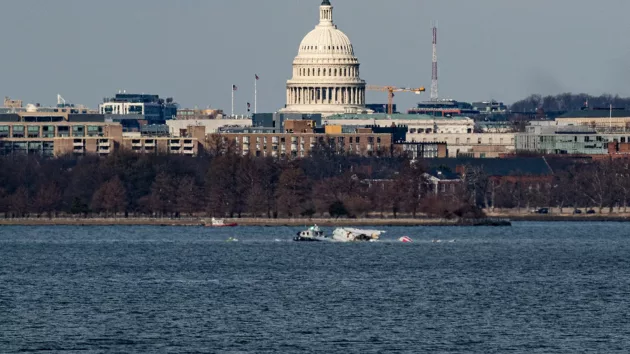
(WASHINGTON) — There’s no indication the U.S. Army Black Hawk crew could tell there was an impending collision before its devastating crash with an American Airlines plane in Washington, D.C., National Transportation Safety Board Chairman Jennifer Homendy said Friday as the agency continues to investigate the cause of the accident.
The helicopter crew may have had bad information on the altitude from their altimeter, as the pilots had differing altitudes in the seconds before the crash, the NTSB said.
One helicopter pilot thought they were at 300 feet and the other thought they were at 200 feet. The NTSB is not prepared to say exactly how high the helicopter was at impact, the NTSB said.
“We are looking at the possibility of there may be bad data,” Homendy said.
The transmission from the tower that instructed the helicopter to go behind the plane may not have been heard by the crew because the pilot may have keyed her radio at the same second and stepped on the transmission from ATC, the NTSB added.
The Black Hawk crew was likely wearing night vision goggles throughout the flight, Homendy said.
The Black Hawk was conducting an annual training flight and night vision goggle check ride for one of the pilots at the time of the crash, Homendy said. This is a practical exam that a pilot must pass to be qualified to perform specific duties, she said.
On the evening of Jan. 29, the American Airlines regional jet was preparing to land at Ronald Reagan Washington National Airport when it collided with the Black Hawk, sending both aircraft plunging into the Potomac River.
No one survived.
Sixty-four people were on board the plane, which departed from Wichita, Kansas. Three soldiers were on the helicopter.
At the news conference, Homendy commended Transportation Secretary Sean Duffy for taking immediate action to restrict helicopter traffic around Reagan airport in the wake of the crash. It’s “too early to say” whether that restriction should be permanent, she said.
Homendy also stressed the safety of U.S. air travel.
Copyright © 2025, ABC Audio. All rights reserved.








